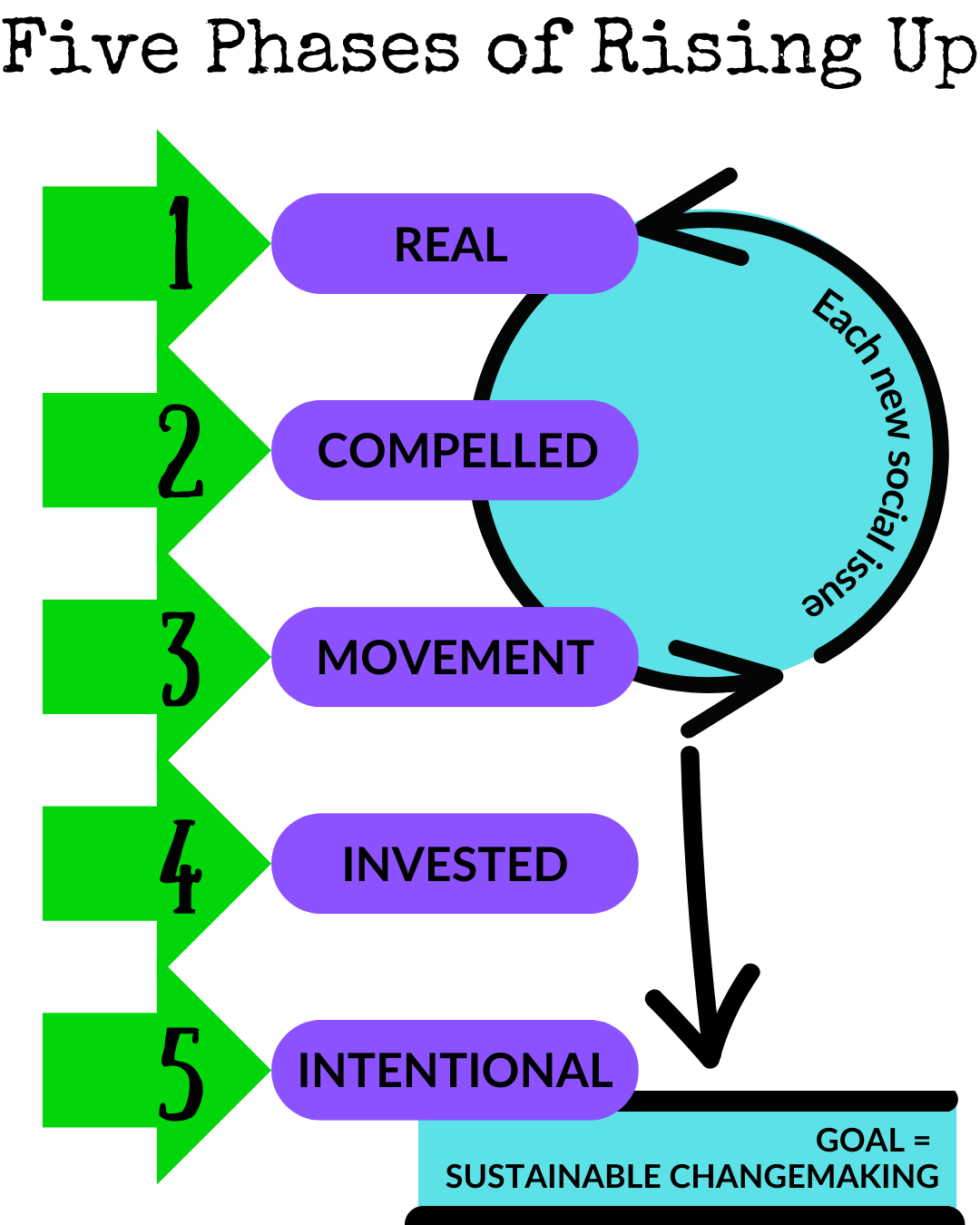Is This You? Let's Define Changemaker
Stepping into who we are to make the difference we're born to make
Hi!
I recently did a poll on @AverageAdvocate’s Insta asking people if they viewed themselves as changemakers. To my great surprise, 50% of the people who responded said they didn’t! Even though the mission, “empowering everyday changemakers!” is stamped on top of everything!
This is far from the first time someone who reads my content has told me they aren’t a changemaker. It made me wonder, do you? And if not, why not?
On this edition of The Table, we are going to get into this defintion a little more to see where you actually fall.
Here we go! Cheer!
As Always, This is What’s In This Edition:
Are You a Changemaker?
February Giveaway
Infographic: Phases of Rising Up
World Changers United: February
Re-re-re-resistance!
1. Are You a Changmaker?
Jumping back in…let’s talk about whether you’re a changemaker!
Tricky Terminology
For years I’d go back and forth with trying out different terms for my group of people here at Average Advocate. For a long time I landed on “world changers.” Some people told me they liked “justice advocates” or “activists” better. But others were repelled by those, viewing them as only being political, but were fine being called “philanthropists” or “social change leaders.” There were those who could relate to “difference-makers” or even simply “people trying to love their neighbor.” But no matter how I tried, even after spending hours with my head stuck in SEO marketing research, I never found the perfect term for us to rally around.
I finally gave up and decided to use the easiest one, determining that every once in a while I just might have to convince you that you are a changemaker–even if you don’t think you are.
“Yep, I’m a Changemaker”
Some of you are going to make this easy for me, no convincing required. You probably work/volunteer in the social impact arena, in a nonprofit, ministry, or a foundation. Maybe you have a business that gives back, are part of a grassroot effort of doing good, or share about social causes. (You’re in Phases Three, Four, or Five of Rising Up, occasionally circling back to Phases One and Two as you care about new things.)
“But I’m Not A Changemaker”
But for the rest of you, the word “changemaker” doesn’t feel like it describes you. There are two primary reasons for this.
1.) The first is that you are in Phases One or Two of Rising Up--so early on in your changemaking journey that you’re just getting your footing.
2.) The other is that you don’t see yourself the way I see you. You don’t perceive how valuable you are. It is vital that you begin believing you are a changemaker because you are important.
Defining Changemaker
I looked up the definition of a “changemaker” in the dictionary and it said something like, “a person who gives change for coins.” GREEAAATTTT. Maybe I didn’t choose the best term after all.
And yet, in the various dictionaries I looked in, they all still displayed example sentences using changemaker like I do here. I guess Merriam-Webster and Dictionary.com need to update their official definitions to match their sentences!
I’ll be kind and let them take ours. Here, I define changemaker like this:
“Someone who takes personal responsibility to meaningfully create positive change for the good of others.”
Not just a feeling
I rewrote that definition many times. At first I started with “Someone who cares enough to act,” but then I realized being a changemaker goes deeper than just “caring enough.” We must see ourselves as meant to. We aren’t driven by just a feeling but a sense of responsibility, duty, calling, design, and ultimately, purpose.
Who we are, not something we do
I also wanted to take out “act,” because this is where we often trip up. If we aren’t currently acting, or holding a meaningful role, then we often write ourselves out.
There are seasons where I’ve barely acted at all, too busy with child rearing or sick and hospitalized. But does that mean I am not a changemaker? No, it does not. My actions might have looked different. Encouraging hospital staff is for the good of others. Raising my kids is creating positive change for the good of others, too (especially if I am teaching them to do the same, like I do through Justice-Minded Kids).
And regardless, much of our future action is driven by seasons of reflection and internal change. No one would do anything for the good of others without space and time to process a need and calling to doing good. I’ll get into this more in April, but a changemaker is someone we are, not something we do.
(If you want to dive into this early, grab your copy of The Life Mapping Workbook where I talk about what I call Be > Do more).
The direction we are moving in
I wanted to conclude this definition with “for the good of all,” because that is our goal—the flourishing of all people. Many of us might care about the homeless on our streets, but not yet the refugees fleeing for their life in Myanmar. Not all of us have the same passion, beliefs, value for specific solutions, or understanding about what people are experiencing. And that is okay.
Can we live in grace and acceptance that we are all still growing? We are all on a path to see the value of each individual and the interconnectedness of humanity—even if those who are far away and different from us. We all start by seeing the worth of our loved ones, and then the neighbor nearby. But we don’t stay here. It is our willingness to move towards the good of others that makes us changemakers.
We self-evaluate with “positive change” + “good of others”
Lastly, “positive change” is also very vague and that is on purpose. People often ask me what social issues I write about, the missions that motivate me, and the causes I fight for. Although you can definitely see things I care a lot about (especially if you watch my stories on IG), my primary goal isn’t to indoctrinate you to engage in a specific agenda.
Positive change is defined differently by all of us. We typically engage in changemaking that is driven by our life experiences and beliefs. Here are examples of what people pour their lives into that they believe are good: a message of hope, a worldview/practice/idea/faith, their children’s community, a ministry, a political ideology, the people they lead, providing healthcare, recovery/survivor services, a nonprofit or human rights initiative, etc…
Sometimes we have firsthand experiences that have helped us that we want others to also experience. We can be convinced something is good because we are listening to others when they tell us what will help them thrive. Maybe we recognize privileges we have that others don’t, and we want others to have access to these. Usually we consider who has power to create positive change and who doesn’t, and then walk alongside those who don’t have much power.
Honestly, sometimes what we think is good might not actually be good for everyone—hence it is important to check to see if the results are actually positive. We are even challenged to consider different perspectives as we evaluate what “for the good of others” is. We are learners, always pivoting as we growWe use this as an evaluation rather than
But ultimately, we all experience the changemaker’s journey if we are trying to create positive change for the good of others.
YOUR NAME HERE is a changemaker!
I don’t have a fifth point for this definition of a changemaker, except that by this definition YOU ARE A CHANGEMAKER! And, dear friend, you are needed. Tap into your powers as an everyday changemaker, a human who has purpose set before them to make a difference!
2. February Giveaway
January’s “travel themed” giveaway is being packed up to be sent to our winner in the midwest. But I have a confession about February’s Giveaway: I still haven’t decided what’s in it! I know it includes ethical coffee and ethical chocolate, but I’m still figuring out the rest.
Considering, I will be sending that out later this month with an update of my book launch. Don’t forget, you only have to enter one time for all the giveaways in this launch! So you can still enter it in advance. How?
⏩ Choose one item to do from my launch list! (Hint: I’m really hoping for some reviews to pop-up on amazon!) Winner chosen at random at the beginning of March! Enter here!
3. Infographic: Phases of Rising Up
I’ve used multiple different names for this over the years, and maybe it’s time I renamed it again to be the “Phases of Changemaking”—but regardless the title, the concepts stay the same.
If you haven’t worked through this guide yet, grab your free copy of the Five Phases of Rising Up! Click here to get it sent to you (this is safest way for me to give you access to this guide).
4. World Changers United: February!
I am all about not reinventing the wheel, overcoming hindrances, complications, and engaging in changemaking the easiest possible way from our real and busy lives.
And I love developing community through the challenge of engaging in good together!
Can you start by telling us one way you will join others in making a difference with a little action?
5. Re-re-re-resistance!
Right now I am seeing content E-V-E-R-Y-W-H-E-R-E about resistance. Although there have definitely been a couple uprisings around the world, I am talking more about resistance to the “powers that be” through nonviolent means.
I’ve been reading through Dorcas’ book “Social Justice For the Sensitive Soul,” (you can see my interview with the author here). She reminds us that research demonstrates that if we want people to flourish, igniting conflict through violence—including verbal violence—actually hinders more than helps. (Ex. Shameful call-outs, yelling, cancelling, us/them division, etc…)
Don’t get me wrong, I understand angry activism (I used to be an unfortunate expert) leveraging rage for what I believed was the greater-good. But I also burned bridges and didn’t love people well, which ended up not helping my cause. Doing good out of anger at injustice is part of the process, in fact it is one of the Phases of Rising Up. I encourage you to consider whether the ways you practice “resistance” are actually doing more good than harm.
It also made me wonder if this narrative of “joining resistance” is a little off. It assumes we need to start doing something from scratch. But is this really the case?
For example, I think many of us are already—at least in some ways—trying to live lives of resistance to injustice. I wrote about this more this weekend from the perspective of someone of faith on my Patheos column here, if you are curious.
In what ways have you already been going against the status quo for the sake of positive change? Name these!
How does this encourage you?
⏩ Where are you in these phases? If you need another perspective I’m confident I can guide you. If you’d like to schedule a free no-pressure discovery call or coaching/consulting session with me let’s do it!
“This really helps!” - coaching client from last week
Thank you again so much for joining me as a changemaker!
- Elisa









